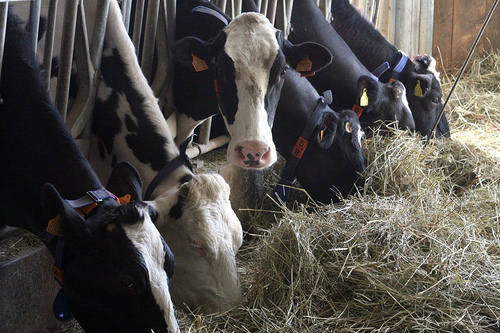The dairy industry continues to play a big role in Massachusetts—as a key participant in local communities and their economies, and as environmental stewards—according to a recent Manomet study. Based on a 2016 survey of MA dairy farmers and other information and funded by the Massachusetts Dairy Promotion Board (MDPB), the study found that MA dairy farmers have support from their local communities and are continuing to increase their use of practices that protect soil health, water quality, and wildlife.
As Mark Duffy, dairy farmer and operator of Great Brook Farm in Carlisle, Massachusetts explains, “Manomet’s work has been key to our efforts to document the benefits and attributes of what the dairy farmers in Massachusetts provide. This report has been key to using science to improve agricultural policies that support the sustainability of dairy agriculture in Massachusetts.”
MA dairy farms help support the local economy by significantly contributing to the economy of the Commonwealth and local communities through jobs, revenue, taxes, and local purchases. Dairy farms purchase most supplies locally at a level of about $150 million a year. MA dairy farms generate almost $700 million in total economic impact. Hence, the average cow generates about $27,000 in economic activity each year…not bad for a bovine!
These dairy farms are supporting their local communities by conserving farmland and agricultural heritage, producing local food, volunteering, and providing recreation access at levels greater than those of other U.S. farmers, landowners, and/or citizens. Almost all MA dairy farms are in programs to conserve land in open space. They provide recreational access to 29,000 acres of land, equal to 20% of the land owned by local MA land trusts. Dairy farm visitor rates are comparable to major recreational lands in the region: dairy farms have an average of 2.9 visitors/acre/year, similar to 3.3 visitors/acre/year for the White Mountains National Forest. For a list of MA dairy farms that offer tours, click here.

“Rural sustainability is complicated,” said Andy Whitman, Director, Sustainable Economies Program. “This study helps us understand how dairy farming in Massachusetts plays an important role in sustaining rural communities. Moreover, because dairy farming in Massachusetts is uniquely multigenerational, the benefits and positive impacts from dairy of today are likely to be here in the future.”
Despite their small size, 65% of dairy farms generate renewable energy using wind, solar, or other cutting-edge practices. Additionally, MA dairy farmers revealed in the study that they continue to be much more likely to apply measures to protect water and soil health and provide wildlife habitat than U.S. farmers elsewhere. A vast majority of MA dairy farmers apply practices for healthy soils and clean water. They also manage 1/3 of their land, voluntarily to benefit wildlife, equal to almost 10% of the land in state wildlife management areas. The application of environmental conservation practices by MA dairy farmers has increased from 2010 to 2015, and exceeds that of national averages. Thus, almost 90% of MA dairy farmers reported in the study that their local communities were supportive or very supportive of dairy farming; a level of support that has increased from about 70% in 2010.
Many MA dairy farmers report that state and federal programs helped improve their farm business, conserve farmland, protect the environment, minimize negative impacts, and ultimately enhance their viability. These programs may have dramatically slowed in the decline of dairy farm numbers in MA after decades of rapid decline.
“Manomet has done an excellent job quantifying the economic, social and environmental value that the Massachusetts dairy industry brings to the Baystate,” notes Jed Davis, Director of Sustainability at Cabot Creamery Co-operative.
This study is one small piece of the science that Manomet is doing to support sustainable food and economic systems.





 Back to all
Back to all